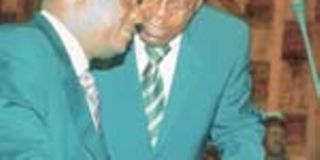Big Three to testify before Ouko inquiry

Ouko Commission of Inquiry members, MPs Kiema Kilonzo (left) and Onyango Oriri during proceedings at Old Parliament Chambers in Nairobi, yesterday.

Dr Ouko
Three big-name witnesses are to give evidence in person to the Ouko inquiry, it was revealed yesterday – former Chief Justice Bernard Chunga, MP Nicholas Biwott and retired Scotland Yard detective John Troon.
First on the stand will be Mr Chunga, who was deputy public prosecutor at the time Dr Ouko died in February 1990.
He will be the first notable official of the former regime to testify before the Parliamentary committee looking into the killing of the Foreign Affairs minister.
His evidence will be followed by that of Mr Troon and then Mr Biwott, who are scheduled to appear before the committee in January.
Inquiry chairman Gor Sunguh announced yesterday that the three were among the final list of people lined up to give evidence before his committee finalises its report by end of next February.

Mr Chunga
Mr Chunga who resigned as Chief Justice last year, was also the lead counsel at the Gicheru Judicial Commission formed by then President Moi in October 1990 to investigate Dr Ouko's murder.
He became Chief Justice after the death of CJ Zaccheaus Chesoni,a post in which he served for about three years before resigning in March last year at the beginning of a purge of the Judiciary by the Narc government.
Mr Chunga's evidence is expected to shed light on the proceedings of the Gicheru commission and the intrigues the team faced before it was disbanded by President Moi in November 1991 before finishing its work.
The former CJ is expected to appear before the team either today or tomorrow, after which the way will be clear for Mr Troon and Mr Biwott to appear after the Christmas break.

Detective Troon
Mr Troon led investigations in Dr Ouko's death between 1990 and 1991 after being invited to head the inquiry by President Moi.
He will be the first to give evidence from January 10, when the proceedings resume.
Mr Biwott is then expected to take to the stand when it is widely expected that he will rebutt evidence given about him given by a number of witnesses, including Swiss business consultant Marianne Brinner who finished her evidence two weeks ago.
Ms Brinner had claimed Mr Biwott had undermined Dr Ouko's attempts to revive Kisumu Molasses Plant and that he had set up two parallel companies for Molasses.
Mr Sunguh, speaking at the start of yesterday's proceedings, said the team's final report will be handed over to Parliament as soon as the House reconvenes after its break which began last Thursday.
Later Mr George Oraro, who was the Ouko family lawyer, and who has been giving evidence for a week, went back on the stand to deny having coerced a witness, Mr David Mburu Mukhwana, to disown evidence he had just given.
Mr Mukhwana had claimed Mr Oraro was among three prominent people who kidnapped Dr Ouko three days before his charred body was found at the foot of a hill near his home at Koru, near Kisumu.
Mr Oraro poured scorn on claims that he gave Mr Mukhwana – a former police officer – Sh30,000 and promised him a further Sh2 million to disown statements in which the policeman had implicated him in Dr Ouko's disappearance.

Mr Biwott
Mr Oraro yesterday withstood numerous questions fired by the MPs Kiema Kilonzo, Joe Khamis, Oburu Odinga and Mr Sunguh himself on what had taken place on February 27 this year, the day Mr Mukhwana visited his office in the company of a Mr Koyoo.
The lawyer said he never told Mr Mukhwana to change his evidence that implicated him in the disappearance of Dr Ouko. He had no reason to do that, he said.
"The statement was so scandalous. If I had been given the opportunity, I would have proved that it was all lies," Mr Oraro said.
Denying he ever discussed with the witness anything to do with the evidence, Mr Oraro said he took Mr Mukhwana to an independent lawyer at and left the two together. Mr Mukhwana later signed an affidavit before the lawyer disowning his earlier remarks before the committee.
"I never advised Mr Mukhwana on anything. He had a statement to make because he had implicated me and it was not within my rights to interrogate him," Mr Oraro said.
Asked by Mr Kilonzo whether he never perceived it as unusual for Mukhwana to go to see him in his office, Mr Oraro replied that "a lot of unusual things had happened before the commitee".
He dismissed claims by Mr Mukhwana attributed to a guard at Dr Ouko's Koru home, Mr Zablon Agallo, that he was one of those whose name appeared in a note as having abducted the Foreign Affairs minister from his home.




